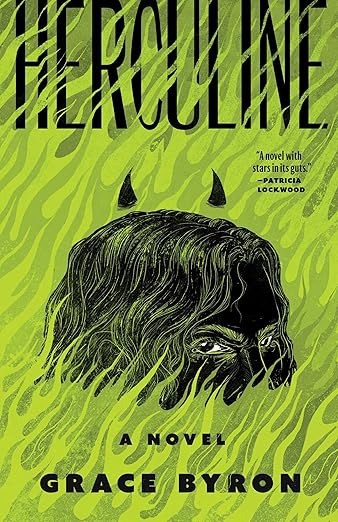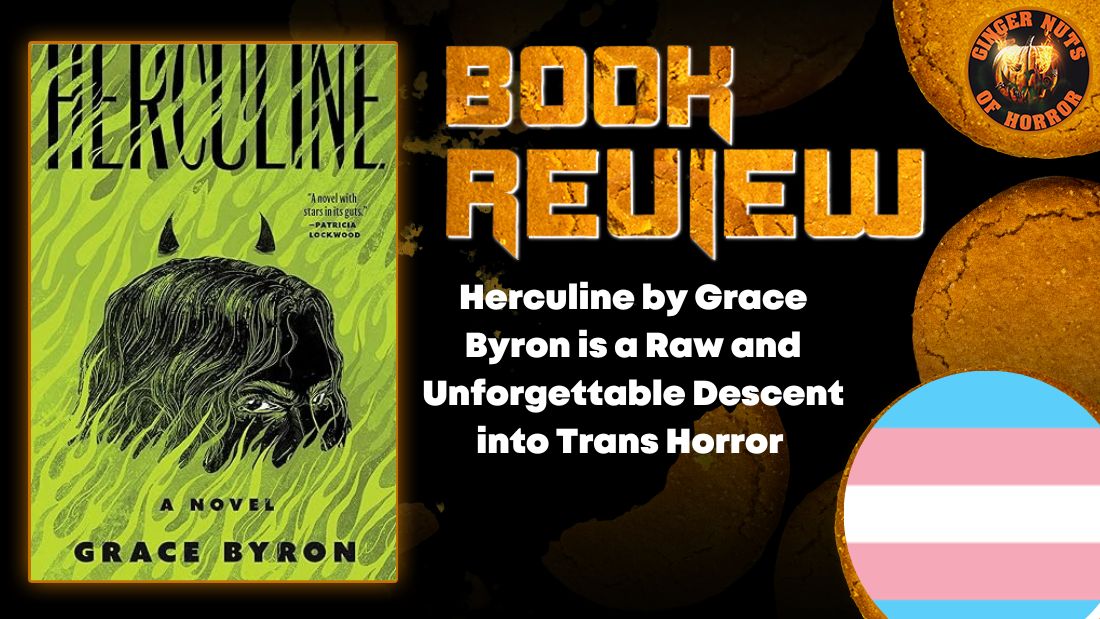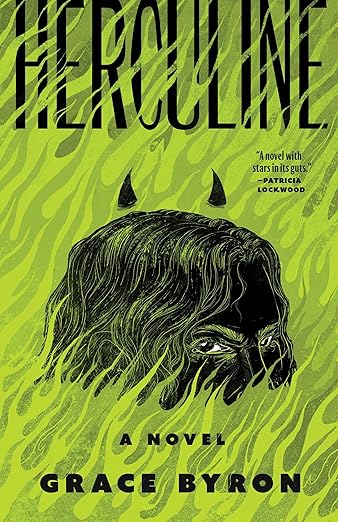Herculine by Grace Byron is a Raw and Unforgettable Descent into Trans Horror

There’s a particular, piercing quality to horror that feels both deeply personal and universally unsettling. It’s the kind of story that gets under your skin not just with its monsters, but with its painful, poignant truths. Grace Byron’s debut novel, Herculine, is this kind of book, a blistering, provocative, and unforgettable plunge into the depths of identity, trauma, and the desperate search for a place to belong. From its gripping first pages to its shocking finale, it establishes Byron as a formidable new voice in horror fiction.
At its heart, Herculine is a story about the demons we carry, both figurative and terrifyingly literal. We follow an unnamed narrator, a young trans woman scraping by in New York City, whose life is a familiar litany of struggles: a shitty retail job, financial precarity, the lingering scars of conversion therapy, and a string of failed relationships.
But her life is also punctuated by something more sinister: nightly debates with sleep paralysis demons and a growing paranoia that a new, ancient evil is stalking her through the city streets. Desperate for escape, she accepts a long-standing invitation from her ex-girlfriend, Ash, to join an all-trans girl commune in rural Indiana, a secluded sanctuary named after the 19th-century intersex memoirist Herculine Barbin.
What follows is an unrelenting portrayal of building dread. At first glance, the commune appears to be the perfect solution to her problems. The promise of community, shared experiences, and understanding is a powerful lure after the narrator’s isolating paranoia. However, Byron plants seeds of doubt from the moment of arrival. The idyllic facade quickly begins to crack, revealing something unsettling beneath the surface.
Girls fall silent when she enters a room, the community library is filled with strange cryptograms, and the charismatic Ash exerts a control that feels increasingly cult-like . The narrator’s quest for safety slowly transforms into a fight for survival, forcing her to confront disembowelled pigs, disturbing psychosexual rituals, and the horrifying realisation that her demons have followed her, and this time, they aren’t letting go.
One of the novel’s greatest strengths is its narrator. She is a brilliantly crafted, deeply flawed, and utterly compelling character. Armed with a vial of holy oil in her purse and a withering, self-deprecating wit, she is by turns cynical, vulnerable, and fiercely intelligent. She’s what some might call a “hot mess,” but her voice is so authentic and immediate that you can’t help but be pulled into her world.
Her internal monologue, a chaotic stream of anxiety, literary ambition, and ketamine-fueled nights, feels painfully real. She’s not always likeable; she grapples with jealousy, judges her peers, and carries a hefty dose of “not-like-other-girls” energy, but these flaws make her human and, more importantly, allow the reader to root for her despite her major flaws. Her struggles are raw and unrelenting, from the economic realities of being trans in America to the complex politics of queer community itself.
Byron’s prose is perfectly matched to this character. It’s sharp, and often darkly funny, capable of pivoting from a wry observation about the horrors of communal breakfast to the terrifying description of a demonic encounter . The writing has a fever-dream quality that mirrors the narrator’s escalating paranoia, making it impossible to distinguish at times what is a supernatural threat and what is the manifestation of her profound psychological trauma. This blurring of lines is where the book’s true horror thrives.
To categorise Herculine as simply a horror novel about demons would be a disservice. Byron uses the horror genre as a powerful lens to examine weighty, real-world themes. The literal demons that haunt the narrator are totally linked to the figurative ones of her past, specifically, the religious trauma inflicted by a conservative Christian upbringing and the brutality of conversion therapy.
The commune itself becomes a twisted metaphor for the promises and perils of seeking refuge. It asks difficult questions: What are we willing to sacrifice for safety and bodily autonomy? Can a community founded on shared trauma become its own kind of trap? The story delves fearlessly into the complexities of trans for trans relationships, the tension between isolationism and integration, and the toxic dynamics that can fester even within marginalised groups.
The horror elements are both inventive and deeply integrated into these themes. The demons are not generic spooks; they feel like externalisations of shame, fear, and the violence the world has inflicted upon these women.
Once the secrets of the Herculine commune begin to unravel, the story accelerates into a gripping, thriller. The climax is both effective and emotionally resonant, bringing the narrator’s internal and external conflicts to a head in ways that are surprising yet satisfying. Grace Byron doesn’t offer easy answers or a neat, cozy ending. Instead, she concludes on a note that is bittersweet yet surprisingly optimistic, emphasising the power of friendship, solidarity, and hard won self-realisation.
Final Verdict: A Must-Read for Our Times
Herculine is not a comfortable read, nor should it be. It’s challenging, graphic, and emotionally demanding. But it is also a brilliant, important, and exhilarating debut. It’s the kind of book that horror fans will devour. More importantly, it’s a vital contribution to queer and trans literature, a story that captures the specific anxieties and joys of its characters without explanation or apology.
In the end, Herculine is a reflection on the messiness of desire, the destructive force of unresolved trauma, and the relentless, courageous work of building an identity in a world that often seems hell-bent on destroying it. It’s a novel that is as insightful about the human condition as it is packed with demonic terror. Grace Byron has created a work that is simultaneously terrifying and thoughtful, visceral and intellectual, specific in its representation of trans experience yet universal in its exploration of belonging and identity.
.
Herculine by Grace Byron
One of the Most Anticipated Books of 2025
Debutiful • LitHub • Our Culture • Maximum Fun •CrimeReads • LGBTQ Reads
A “paranoid, self-annihilating” (Gretchen Felker-Martin, author of Manhunt and Cuckoo) horror debut following a woman who seeks refuge at an all-trans girl commune only to discover that demons haunt her fellow comrades—and she’s their next prey!
Herculine’s narrator has demons. Sure, her life includes several hallmarks of the typical trans girl sob story—conversion therapy, a string of shitty low-paying jobs, and even shittier exes—but she also regularly debates sleep paralysis demons that turn to mist soon after she wakes and carries vials of holy oil in her purse. Nothing, though, prepares her for the new malevolent force stalking her through the streets of New York City, more powerful than any she’s ever encountered. Desperate to escape this ancient evil, she flees to rural Indiana, where her ex-girlfriend started an all-trans girl commune in the middle of the woods.
The secluded camp, named after 19th-century intersex memoirist Herculine Barbin, is a scrappy operation, but the shared sense of community among the girls is a welcome balm to the narrator’s growing isolation and paranoia. Still, something isn’t quite right at Herculine. Girls stop talking as soon as she enters the room, everyone seems to share a common secret, and the books lining the walls of the library harbour strange cryptograms. Soon, what once looked like an escape becomes a trap all its own.
While trying to untangle the commune’s many mysteries, the narrator contends with disembowelled pigs, cultlike psychosexual rituals, and the horrors of communal breakfast. And before long, she discovers that her demons have followed her. And this time, they won’t be letting her go.
Horror Book Reviews on Ginger Nuts of Horror
For dedicated horror fans seeking their next chilling read, Ginger Nuts of Horror has established itself as a must-visit destination. Driven by a passion for the genre, the website offers more than just standard reviews, providing a deep dive into the world of dark fiction that keeps a global community of readers coming back for more.
A genuine, infectious enthusiasm for horror fuels Ginger Nuts of Horror. Founded by Jim Mcleod, the site has grown from a personal project into a significant resource. The site’s unique appeal stems from its “sense of fun” and the evident “joy for horror“. This passion translates into thoughtful coverage that explores the emotional and thematic depths of horror, looking beyond monsters to the “feelings and emotion” that make the genre so powerful.
The site offers a diverse range of content catering to a wide variety of horror tastes. Readers can find:
- Thoughtful Reviews
- Author Insights: In-depth interviews that provide fascinating glimpses into the creative processes of renowned authors.
- Genre Exploration: A commitment to pushing boundaries and highlighting authors who try new things, ensuring readers discover fresh and innovative voices.
With over 16 years of experience, Ginger Nuts of Horror has built a reputation for credibility and consistency. It is frequently nominated for awards and has become a go-to source for readers seeking honest and engaging opinions. The site excels at creating a shared reading experience, helping readers not only find books they’ll love but also understand the deeper currents moving through the horror genre today.
For anyone looking to stay informed and inspired in the world of horror literature, Ginger Nuts of Horror is an invaluable resource. Its blend of expertise, passion, and diverse content makes it the perfect guide for navigating the ever-expanding shelves of dark fiction.





